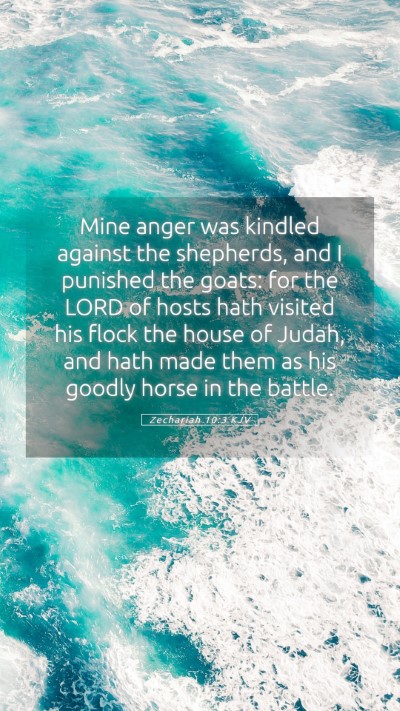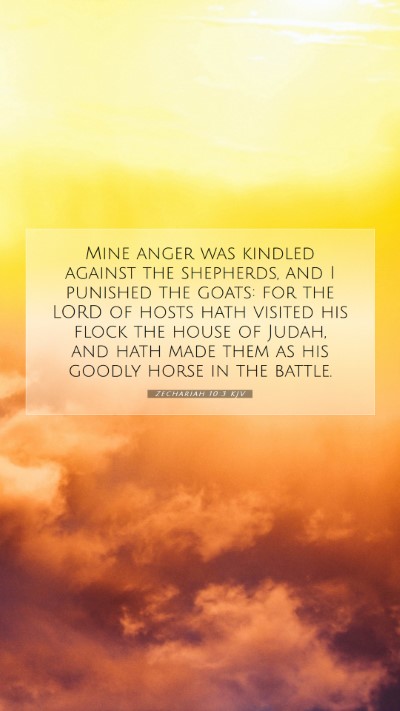Old Testament
Genesis Exodus Leviticus Numbers Deuteronomy Joshua Judges Ruth 1 Samuel 2 Samuel 1 Kings 2 Kings 1 Chronicles 2 Chronicles Ezra Nehemiah Esther Job Psalms Proverbs Ecclesiastes Song of Solomon Isaiah Jeremiah Lamentations Ezekiel Daniel Hosea Joel Amos Obadiah Jonah Micah Nahum Habakkuk Zephaniah Haggai Zechariah MalachiZechariah 10:3 Meaning
What is the meaning of Zechariah 10:3?
Mine anger was kindled against the shepherds, and I punished the goats: for the LORD of hosts hath visited his flock the house of Judah, and hath made them as his goodly horse in the battle.
Zechariah 10:3 Bible Verse Meaning
Understanding Zechariah 10:3
Bible Verse: Zechariah 10:3 - "Mine anger was kindled against the shepherds, and I punished the goats: for the Lord of hosts hath visited his flock the house of Judah, and hath made them as his goodly horse in the battle."
Overview
Zechariah 10:3 reveals God's displeasure towards the spiritual leaders (shepherds) who have failed to lead the people in righteousness and care. This verse highlights God's initiative to redeem and strengthen His people, in this case, the house of Judah. The metaphor of the "goodly horse in the battle" implies empowerment for victory and strength.
Bible Verse Meanings
- Anger Against the Shepherds: God's anger signifies His justice and concern for His people, which reflects a theme of accountability in leadership.
- Judgment on the Goats: The goats here symbolize leaders who have misled the people; God’s judgment underscores the seriousness of spiritual leadership.
- Visitation of the Flock: God's visitation indicates active involvement in the lives of His people, stressing His role as a protector and redeemer.
- Goodly Horse: The metaphor suggests that God positions His people for success, giving them strength and resilience, particularly in times of conflict.
Bible Verse Interpretations
- Matthew Henry's Commentary: Henry emphasizes God's care for His people, drawing parallels between the shepherds' failures and the judgment they would face. He reflects on God's promise to empower Judah for victory and restoration.
- Albert Barnes’ Remarks: Barnes discusses the significance of divine intervention for Israel, highlighting that God's displeasure serves to correct and ultimately lead them to triumph.
- Adam Clarke’s Observations: Clarke notes the symbolic language used to describe God's flock, suggesting that God's intent is to reinstate their former glory and strength through divine action.
Scripture Analysis
Understanding Scripture involves examining the historical context and the imagery used, as seen in Zechariah 10:3. The reference to 'shepherds' and 'goats' highlights the moral obligations of spiritual leaders and sets a tone for accountability in leadership roles. The prophetic nature of this verse encourages groups engaging in Bible study to consider the implications of leadership and divine justice.
Additional Insights
- Critical Contextual Analysis: This passage is situated in a prophetic book that seeks to offer hope and direction following the Babylonian exile. It calls to attention God's ongoing relationship with Israel and His willingness to restore them.
- Themes of Restoration: Central to this verse is the theme of restoration, where God transforms His people from desolation to victory, reminding us of His redemptive power throughout the ages.
- Application Today: The implications for contemporary believers are significant. As stewards of faith, leaders are reminded of their impactful role, and the faithful are called to put their trust in God's ability to strengthen and guide them.
In-depth Bible Verse Analysis
Zechariah 10:3 affirms that God not only observes the failing of leaders but also acts upon this to realign His people according to His will. This verse can be a point of discussion in Bible study groups exploring themes of leadership, accountability, and divine empowerment. Asking questions such as "What does this mean for our leaders today?" or "How can we apply these teachings to our understanding of spiritual authority?" can yield fruitful conversation and learning.
Related Cross References
- Isaiah 40:11 - God's portrayal as a shepherd for His people.
- Ezekiel 34:10 - Accountability of the shepherds and their judgment.
- John 10:11 - Jesus as the good shepherd, emphasizing care and sacrifice.
Conclusion
Zechariah 10:3 serves as a powerful reminder of God's sovereignty, the responsibility of leaders, and the assured restoration for His people. Engaging with such verses through Bible study resources and Bible study lessons can enhance our understanding and application of Scripture in daily life.


